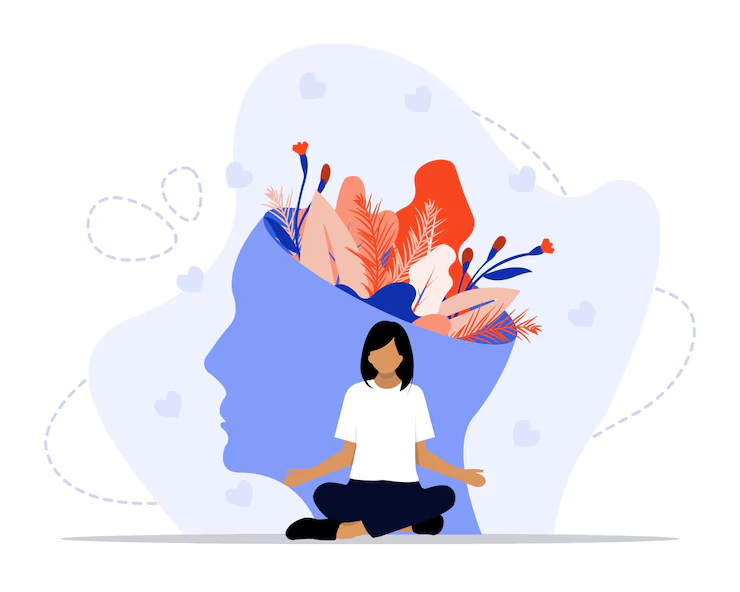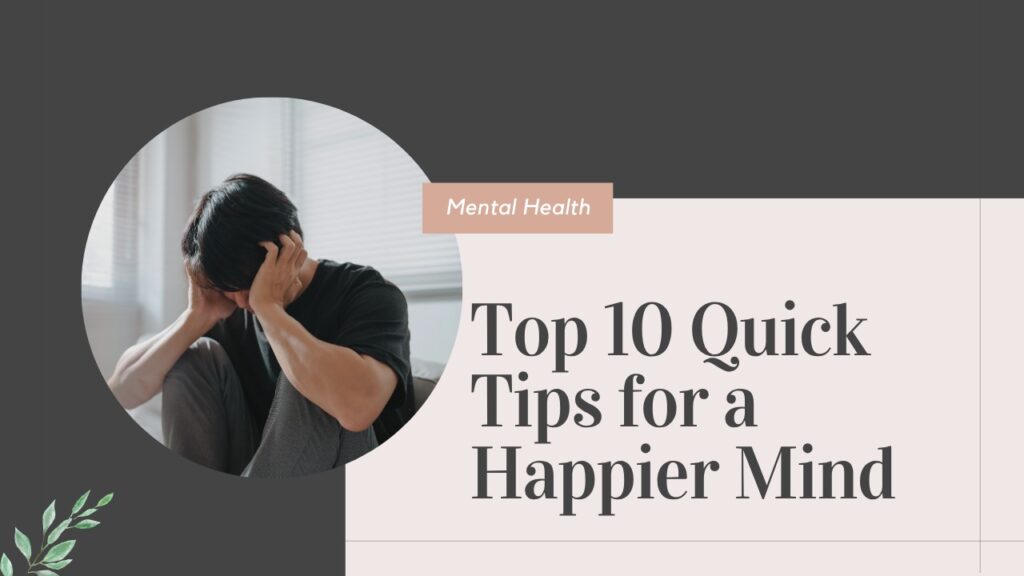Mental health plays a vital role in our overall well-being. It affects how we think, feel, and respond to different situations in life. When our mental health is in good shape, it’s easier to manage daily challenges, build strong relationships, and make sound decisions. Like physical health, mental well-being needs regular attention and support.
In today’s fast-moving world, it’s easy to get caught up in daily tasks and forget about mental self-care. Work, school, family duties, and social pressures can all take a toll. Over time, stress, anxiety, or even feeling overwhelmed can build up if left unaddressed. That’s why recognizing how you feel and seeking support when needed is so important.
Taking time for yourself, practicing relaxation, or simply talking to someone can make a big difference. Whether you’re feeling low or just need a boost, putting your mental health first helps create a more balanced, healthier life.
This article will not only explore the importance of mental health but will also provide you with 10 quick and practical mental health tips that you can implement in your life right now.
What is Mental Health ?
Mental health is about how we think, feel, and connect with others. It includes our emotional, psychological, and social well-being. Good mental health helps us manage stress, build strong relationships, and make healthy choices. It’s not only about avoiding mental illness—it also means feeling emotionally balanced, staying positive, and having a clear sense of purpose in life.
A person with good mental health can cope with life’s ups and downs more easily. They are able to face challenges, recover from setbacks, and enjoy life’s moments. Feeling happy, calm, and confident are all signs of positive mental health. It also helps in maintaining focus, making good decisions, and staying motivated.
Many factors affect our mental health. These include family history, personal experiences, physical health, and the environment we live in. Stressful events, trauma, or health problems can all impact how we feel mentally. That’s why it’s important to take care of both body and mind.

Taking simple steps—like getting enough sleep, eating well, staying active, and talking to someone when needed—can protect and support your mental health. Caring for your mental well-being is just as important as caring for your physical health.
Why is Mental Health Important ?
The importance of mental health cannot be overstated. Good mental health enables individuals to:
Manage Stress: Stress is a part of everyday life, but maintaining good mental health helps you respond to it in healthier ways. When your mind is strong and balanced, you’re better able to face challenges without becoming overwhelmed or anxious.
Build Healthy Relationships: Positive mental health supports strong communication, empathy, and trust, which are essential for building and maintaining healthy relationships. Whether with family, friends, or coworkers, a stable mindset helps you connect and interact more effectively.
Enhance Productivity: A clear and focused mind improves your ability to stay organized, solve problems, and think creatively. Good mental well-being allows you to be more productive at work, school, or in your personal goals, leading to better outcomes.
Maintain Physical Health: Your mental and physical health are deeply connected. Poor mental health can affect your sleep, eating habits, and even lower your immune system. Taking care of your mind helps your body function better too.
Develop Resilience: Good mental health builds inner strength, allowing you to recover from hardships more quickly. It helps you stay hopeful, adapt to change, and keep moving forward during tough times.
Boost Self-Esteem: When you care for your mental health, you tend to feel more positive about yourself. This builds self-confidence, helps you recognize your worth, and supports a healthy self-image.
In contrast, poor mental health can lead to a variety of issues such as anxiety, depression, mood disorders, substance abuse, and even physical health problems like heart disease or high blood pressure.
Top 10 Quick Mental Health Tips
The following tips are designed to improve mental well-being and are simple enough to incorporate into daily life. Whether you are feeling down or simply want to maintain your mental health, these tips will help you manage your mental state with ease.
Practice Deep Breathing

One of the quickest and easiest ways to reduce stress and support mental health is by practicing deep breathing exercises. These exercises help calm the mind and bring your focus to the present moment, making you feel more in control.
When you slow down and pay attention to your breath, it sends a signal to your body to relax. This can lower your heart rate, ease muscle tension, and reduce feelings of anxiety. Deep breathing also helps balance oxygen and carbon dioxide levels in the body, which can create a sense of calm.
Taking a few minutes each day to practice deep breathing can make a big difference in how you feel. It’s a simple yet powerful tool that you can use anytime—whether you’re at home, at work, or in a stressful situation—to feel more relaxed and centered.
How to Do It:
Sit in a comfortable position.
Take a deep breath in through your nose for 4 counts, hold it for 4 counts, then slowly exhale for 6 counts.
Repeat this 4-5 times to feel calmer and more focused.
This quick exercise is a great way to clear your mind and center yourself in moments of stress.
Exercise Regularly
Physical activity is a powerful tool for boosting mental health. Moving your body regularly helps clear your mind, reduce stress, and lift your spirits. Even small amounts of exercise can make a noticeable difference in how you feel.
When you exercise, your body releases endorphins—natural chemicals that create a sense of happiness and well-being. These “feel-good” hormones can help lower anxiety, ease tension, and improve your overall mood. Physical activity also helps you sleep better and feel more energized throughout the day.
You don’t need to spend hours at the gym to feel the benefits. A brisk walk around your neighborhood, a short jog, or a quick yoga session can all boost your mood. Making regular movement a part of your daily routine can help you stay mentally and physically balanced, no matter how busy life gets.
Why It Works:
Increases serotonin, which helps combat feelings of depression and anxiety.
Reduces stress by lowering cortisol levels.
Enhances sleep quality, which in turn improves mental health.
Even if you can only spare a few minutes each day, make it a habit to get moving.
Prioritize Sleep

Getting enough sleep is essential for a healthy mind. Sleep helps your brain rest, recharge, and prepare for the next day. When you sleep well, you’re more likely to feel calm, focused, and emotionally balanced.
Not getting enough sleep can affect how you think and feel. It may lead to mood swings, trouble concentrating, and poor decision-making. Over time, lack of sleep can increase feelings of stress and anxiety, making it harder to handle daily challenges.
To support your mental well-being, try to get 7 to 9 hours of good-quality sleep each night. Create a relaxing bedtime routine, avoid screens before bed, and keep your sleep environment quiet and comfortable. Making sleep a priority can improve both your mental and physical health, helping you feel more refreshed and ready to take on the day.
Tips for Better Sleep:
Set a regular bedtime and wake-up time, even on weekends.
Avoid caffeine or large meals before bed.
Limit screen time in the hour before sleeping, as blue light from devices can interfere with your ability to fall asleep.
By taking care of your sleep, you’re also caring for your brain’s ability to regulate emotions and mental clarity.
Connect with Others
Having social support is very important for good mental health. Staying connected with others helps you feel less alone and more understood. Talking to someone who cares can bring comfort, especially when you’re going through a difficult time.
Friends, family members, or support groups can all offer emotional support. They listen, share advice, and help you see things from a different point of view. These connections give you a sense of belonging and remind you that you’re not facing life’s challenges alone.
Reaching out and building relationships can improve your mood and reduce stress. Whether it’s a quick chat, a shared activity, or simply spending time together, human connection adds meaning to life. Making time for social interaction can be a simple but powerful way to protect and strengthen your mental well-being.
Ways to Stay Connected:
Schedule regular catch-ups with loved ones.
Join clubs or groups that interest you.
Consider volunteering or engaging in community activities to create new relationships.
Sometimes, simply talking to someone about what you’re going through can be incredibly therapeutic.
Practice Gratitude

Taking time to focus on what you’re grateful for can have a big impact on your mental health. It helps shift your attention away from stress and negative thoughts, allowing you to see the good things in your life more clearly.
Practicing gratitude regularly—such as writing down what you’re thankful for or simply reflecting on positive moments—can help build a more hopeful and positive mindset. Over time, this practice strengthens emotional balance and helps you cope better with challenges.
Research shows that gratitude can improve your overall well-being and reduce feelings of sadness or depression. It encourages a healthier outlook on life and makes it easier to stay calm and content. Making gratitude a small daily habit can lead to long-term improvements in how you feel both mentally and emotionally.
How to Do It:
Each day, write down three things you’re grateful for.
Be specific and take time to reflect on why you’re thankful for them.
Try to make it a habit—perhaps just before bed, to end your day on a positive note.
By practicing gratitude, you train your brain to focus on the positive, reducing the impact of negative thoughts.
Eat a Balanced Diet
What you eat plays an important role in how you feel mentally. A healthy, balanced diet can help support brain function and improve your mood. Eating well gives your mind the fuel it needs to stay sharp and stable.
Foods that are rich in nutrients—like omega-3 fatty acids, vitamins, and antioxidants—can boost mental clarity and emotional well-being. These nutrients help protect the brain and support healthy communication between brain cells, which is important for staying focused and calm.
In contrast, eating too many processed foods, sugary snacks, or caffeine-heavy drinks can make you feel anxious, tired, or moody. These types of foods can cause energy crashes and affect your mood over time. Choosing nutritious meals and snacks can make a big difference in how you think and feel each day, supporting both your mental and physical health.
What to Include:
Leafy greens, nuts, seeds, and fish for healthy fats and brain-boosting nutrients.
Fresh fruits and vegetables to provide vitamins and antioxidants.
Hydrate with water to support brain function and overall mood.
Healthy eating not only improves your physical health but also provides the energy and mental clarity needed to stay positive.
Mindfulness and Meditation

Mindfulness means paying close attention to the present moment and noticing your thoughts, feelings, and surroundings without judging them. It’s about being fully aware of what’s happening right now, instead of dwelling on the past or worrying about the future.
Practicing mindfulness through meditation can help calm your mind and reduce stress. It teaches you how to stay focused, handle emotions better, and feel more at peace. Meditation can also improve sleep, lower anxiety, and help you respond to life’s challenges more calmly.
You don’t need to spend hours meditating to see results. Just a few minutes each day—sitting quietly and focusing on your breath—can make a positive difference over time. Making mindfulness part of your routine can lead to better mental clarity, emotional strength, and overall well-being.
How to Practice Mindfulness:
Start by focusing on your breath, letting go of distractions.
Gently bring your attention back to your breath when your mind wanders.
Gradually increase the time you spend practicing mindfulness.
There are plenty of apps available that can guide you through mindfulness and meditation sessions, even if you’re just getting started.
Limit Social Media Use
In today’s digital world, social media can have a big influence on our mental health. Constantly seeing other people’s highlight reels can lead to comparing ourselves, which may cause feelings of inadequacy or self-doubt.
The pressure to appear perfect online can also affect how we view ourselves. Whether it’s keeping up with trends or presenting an ideal image, this can create stress and anxiety about living up to unrealistic standards. The fear of missing out (FOMO) is another common issue tied to social media.
Cyberbullying is another harmful aspect that can take a toll on mental well-being. Negative comments or online harassment can lead to feelings of isolation, low self-esteem, and sadness. Being mindful of your social media habits, limiting exposure, and focusing on positive connections can help protect your mental health in this digital age.
Tips for Social Media Detox:
Set time limits on your social media usage.
Unfollow accounts that trigger negative emotions or self-doubt.
Take regular breaks from social media to focus on real-life interactions.
By reducing your social media consumption, you can improve your self-esteem and reduce anxiety.
Set Realistic Goals

Setting goals provides direction and a clear sense of purpose in life. Having something to work towards gives you motivation and helps you stay focused on what’s important.
However, it’s crucial to set goals that are realistic and achievable. Setting goals that are too big or unrealistic can lead to frustration, stress, and a sense of failure. Make sure your goals are within reach and align with your abilities and resources.
Breaking larger tasks into smaller, manageable steps can make them feel less overwhelming. By focusing on one step at a time, you can maintain progress without getting burned out. Celebrating small successes along the way helps keep you motivated and positive as you work toward your larger goals.
How to Set Effective Goals:
Make your goals specific and measurable (e.g., instead of “get in shape,” aim for “exercise three times a week”).
Keep your goals manageable and realistic within your current circumstances.
Celebrate small wins to build momentum.
Achieving small goals fosters a sense of accomplishment and reinforces positive behavior.
Seek Professional Help When Needed
It’s important to know when to seek professional support for your mental health. Sometimes, the challenges we face may feel overwhelming or too difficult to handle alone. Recognizing this is the first step toward getting the help you need.
Mental health professionals like therapists, counselors, and psychiatrists are trained to help people work through deeper emotional or psychological struggles. They provide a safe space to talk and offer strategies for coping with stress, anxiety, or other mental health concerns.
Seeking help doesn’t mean you’re weak—it’s a proactive step in taking care of yourself. Professionals can guide you in managing your emotions, improving your mental well-being, and finding solutions to issues that might seem hard to overcome. Reaching out for help can be the key to gaining support and building a healthier, more balanced life.
When to Seek Help:
If you experience persistent feelings of sadness, hopelessness, or anxiety.
If your mental health impacts your daily functioning.
If you feel disconnected from yourself or others.
There’s no shame in asking for help. Professionals are trained to support you through difficult times and provide tools to help you thrive.
Conclusion
In conclusion, mental health is just as crucial as physical health and should never be overlooked. It affects how we think, feel, and navigate the world around us. By prioritizing mental well-being, we not only improve our emotional resilience but also our overall quality of life.
Implementing quick mental health tips—such as practicing mindfulness, exercising, connecting with others, and eating well—can significantly boost our mental state in the short term and set us up for long-term well-being. Even small, consistent efforts can lead to noticeable improvements in mood, energy, and stress management.
Remember, mental health care isn’t a one-size-fits-all approach, and it’s okay to seek professional help when necessary. Just like our bodies need rest and care, our minds require attention and nurturing. By taking the time to care for our mental health, we build a stronger, more resilient foundation to thrive in all aspects of life.
FAQs
- Why is mental health important ?
Mental health affects how we think, feel, and act. It influences our ability to cope with stress, build relationships, and make decisions. Good mental health promotes overall well-being, while poor mental health can lead to emotional, physical, and social challenges. - How can I improve my mental health quickly ?
You can improve your mental health quickly by practicing deep breathing, exercising, eating a balanced diet, connecting with others, and incorporating mindfulness or meditation into your daily routine. - How much sleep do I need for good mental health ?
Most adults need 7-9 hours of quality sleep per night. Sleep is essential for emotional regulation, cognitive function, and overall mental well-being. Lack of sleep can lead to increased stress and anxiety. - Can physical exercise help my mental health ?
Yes! Regular physical activity releases endorphins, which are natural mood boosters. It also helps reduce anxiety, improve sleep, and enhance overall mental clarity. - When should I seek professional help for my mental health ?
If you experience persistent feelings of sadness, hopelessness, or anxiety that affect your daily life, it’s a good idea to seek professional help. A therapist or counselor can provide guidance and coping strategies tailored to your needs.
